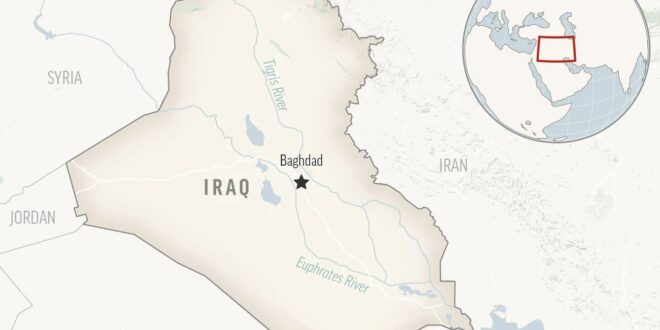Iran and Iraq have reached an agreement to disarm members of Iranian Kurdish dissident groups based in northern Iraq and relocate their members from their current bases, officials from the two countries said Monday.
Nasser Kanaani, the spokesman for Iran’s Foreign Ministry, said in a news briefing Monday that the Iraqi government had agreed “to disarm the armed terrorist groups stationed in Iraq’s territory by September 19, and then, evacuate and transfer them from their military bases to camps designated by the Iraqi government.”
He added that the deadline would not be extended and that while relations between the two countries are “entirely friendly and warm … the presence of terrorists in the northern region of Iraq is an unpleasant stain on mutual ties.”
Iran has periodically launched strikes targeting members of the Kurdistan Democratic Party in Iran, or KDPI, and other Iranian Kurdish dissident groups based in Iraq’s semi-autonomous Kurdish region near the border with Iran.
An Iraqi government official, who spoke on condition of anonymity because he was not authorized to speak to the media, confirmed the agreement was signed between the two countries and said the central government in Baghdad is “working as quickly as possible” to relocate the groups with the approval of authorities from the Kurdish regional government in Irbil and Sulaimaniyah.
He declined to give the exact location to which the disarmed militants would be moved, but said it will be within the Iraqi Kurdish region. He said they “will have a camp to live in and will be without arms.”
Different Iranian dissident groups in Iraq are aligned with each of the two main Iraqi Kurdish parties – the Kurdistan Democractic Party, with its seat of power in Irbil, and the Patriotic Union of Kurdistan party, whose stronghold is in Suleimaniyah – and are at odds with each other as well as with Iran.
“Previously Sulaimaniyah would accuse Irbil of working with these groups, and Erbil would accuse Sulaimaniyah of working with them, but as a central government we agreed to relocate them,” the Iraqi official said. “We are trying as hard as possible for this to take place on Sept. 19.”
Iraqi Prime Minister Mohammed Shia al-Sudani came to power last year via a coalition of Iranian-backed parties and is seen as close to Iran, although he has also attempted to build ties with the United States and Turkey.
A spokesman for Sudani, Hisham al-Rikabi, said in a statement that the prime minister “has spoken on more than one occasion about the government’s refusal for the Iraqi land to be … a launching pad for targeting neighboring countries.”
In addition to disarming the militant groups and removing their bases, he said, the agreement with Iran promises that Iraq will deploy border guards to prevent the “infiltration of militants” across the border and will hand over wanted suspects to Iran “after the issuance of arrest warrants in accordance with the law.”
 Eurasia Press & News
Eurasia Press & News




